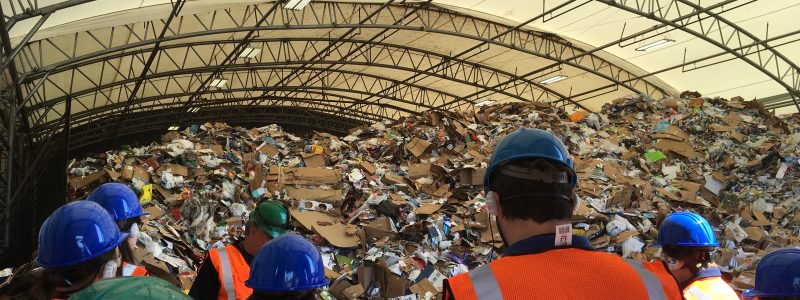Recently, many businesses have asked how changes to recycling markets are affecting regional recycling efforts. With increased interest, Green Check businesses were offered the opportunity to tour Lexington’s Recycling Center (a.k.a LFUCG Regional Recycling Facility).
Plant manager, Barry Prater, welcomed attendees with a general overview of the drivers of recycling markets, as well as the challenges Lexington faces in the recycling industry. Following the introduction, attendees visited the tipping floor, where materials are offloaded from the collection trucks. The tipping floor is also where Green Check business leaders are introduced to the issue of contamination in the recycling stream.
Recycling contamination, or the prevalence of non-recyclable materials in the recycling stream, is perhaps the largest challenge facing Lexington’s recycling efforts. The most common contaminants are plastics that are not screw top bottles and jugs, such as plastic bags. Mr. Prater explained that full black bags are immediately discarded, as the uncertainly of their contents poses safety concerns for facility workers. Clear and white bags are less of a safety concern, but are still considered contamination because they cannot be processed on the facility’s machines. Often times small, plastic grocery bags are missed by the workers manually sorting the incoming stream, and the bags will get caught in the sorting machines. This leads to costly shut downs of the plant and often requires machine replacement.
As they moved through the facility, Green Check attendees were surprised by the prevalence of workers stationed along the entire sorting line. In fact, recycling is a major contributor to America’s economy. According to the Institute of Scrap Recycling Industries, the recycling industry provides 564,000 direct and indirect jobs and contributes around $17 billion in payroll taxes, and the sector as a whole can potentially provide additional employment and economic growth. This is especially true here in Lexington. Should our community succeed in reducing contamination in the recycling stream, processing would become more efficient and result in a higher quality resale product. This would give the facility opportunity to create more jobs and potentially allow for greater variation in material acceptance.
To learn more about materials accepted and where to take specialized recycled items, please refer to the LFUCG Recycling webpage at https://www.lexingtonky.gov/recycling.






